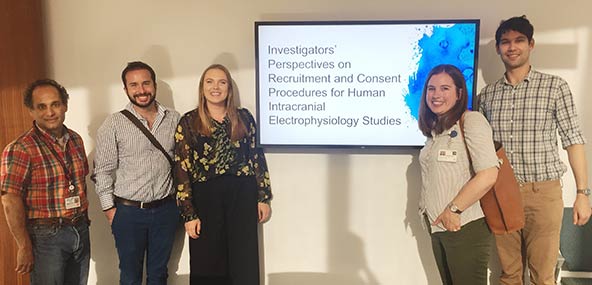Consent and recruitment in neurophysiology studies

Joncarmen (JC) Mergenthaler led a works-in-progress seminar about his current investigation into consent and recruitment within intracranial electrophysiology studies, which require utilization of patients with preexisting cause for neurosurgical treatment, such as epilepsy or Parkinson’s disease. Adding research to clinically-indicated neurosurgery introduces an array of ethical concerns, from increased time on the operating table to conflict of interest to therapeutic misconception. JC presented preliminary findings from 11 of 26 semi-structured interviews with members of neurophysiology research teams, and our group discussed common themes, including standardization, consent processes, unique risks, and vulnerability.
The initial evidence reveals diversity in who introduces the study to the patient, who obtains consent, and when consent is obtained. We weighed the benefits and detriments of having a neurosurgeon act as the consenting team member; for instance, the advantage of providing expert knowledge to patients versus the risk of conflating clinical treatment with research practice. We also explored possible explanations for the widespread perception among PIs that their research protocol aligns with that of similar studies despite inter-study inconsistencies revealed by the data. When discussing efforts to prevent enrollment of “desperate” or misinformed patients, we questioned the methods by which these studies assess patients’ capacity to consent and comprehension of research-specific risks. We contemplated the use of third-party consent monitors as well as the limits of online survey tools for evaluating capacity.
 Decision Lab
Decision Lab